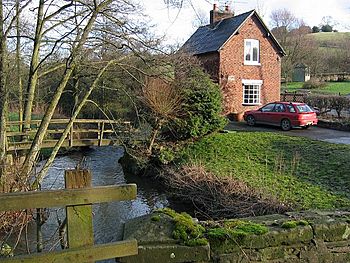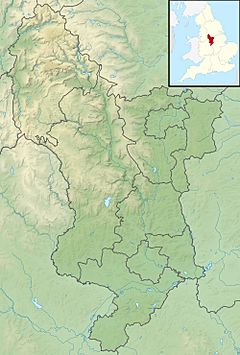Bentley Brook, Bradbourne facts for kids
Quick facts for kids Bentley Brook |
|
|---|---|

Bentley Brook at Woodeaves
|
|
|
Confluence with the River Dove shown in Derbyshire
|
|
| Country | England |
| Counties | Derbyshire |
| Physical characteristics | |
| Main source | Brassington, Derbyshire 53°04′55″N 1°39′50″W / 53.0819°N 1.664°W |
| River mouth | Mayfield, Derbyshire 53°00′48″N 1°45′46″W / 53.0133°N 1.7627°W |
| Length | 14.5 km (9.0 mi) |
| Basin features | |
| Basin size | 63 km2 (24 sq mi) |
| Tributaries |
|
| Progression : Bentley Brook—Dove—Trent—Humber | |
The Bentley Brook is a small river in Derbyshire, England. It is also sometimes called the Bradbourne Brook. This brook flows for about 14.5 kilometers (9 miles) before joining a bigger river called the River Dove.
Contents
What's in a Name?
This little river has different names along its journey! Near its start, it's known as the Haverhill Dale brook. As it flows, another small stream called the Bletch brook joins it. After this meeting, it becomes the Bradbourne brook. Finally, closer to where it meets the River Dove, it's known as the Bentley Brook.
Where Does the Brook Flow?
The Bentley Brook starts south of a village called Brassington. From there, it generally flows towards the southwest. It passes by the village of Bradbourne and an old mill. This is where it meets the Bletch brook.
After joining with the Bletch brook, it continues southwest. It goes past a small place called Woodeaves and then the village of Fenny Bentley. You might even spot the Bentley Brook Inn there! The brook then turns directly south. After flowing north of Ashbourne, it finally joins the River Dove near the village of Mayfield.
Old Mills Along the Brook
For hundreds of years, rivers like the Bentley Brook were very important. They provided power for mills that helped people with their work.
Bradbourne Mill
The water-powered mill at Bradbourne is thought to be the oldest working watermill in Derbyshire. It was built way back in 1726! This mill was used to grind corn (like wheat for flour) until the 1920s.
This three-story mill was special because it had two large waterwheels, each about 4 meters (12 feet) wide. These wheels used the force of the water to turn the mill's machinery. The waterwheels and the mill pond (where water was stored for the mill) were fixed up in 2008. Now, the building is used as homes.
Woodeaves Cotton Mill
There was another important mill at Woodeaves, a small area near Fenny Bentley. This was the Tattersall Cotton Mill, built in 1784. It was a "cotton doubling mill," which means it twisted cotton threads together to make them stronger. About 100 people worked there!
The mill got its water from the brook through a long channel called the Woodeaves Canal. Later, a steam engine was used to power the mill instead of water. Most of this old mill was taken down in the early 1900s.
Brook's Environment
The land around the Bentley Brook is made up of different types of rock, like limestone, gritstone, and shale. The area that collects water for the brook is about 63 square kilometers (24 square miles). The part of the brook from Fenny Bentley to where it meets the River Dove is officially called a "main river" by the Environment Agency. This means it's an important waterway that they manage.
Images for kids
-
Ford through the brook on the road to Tissington



